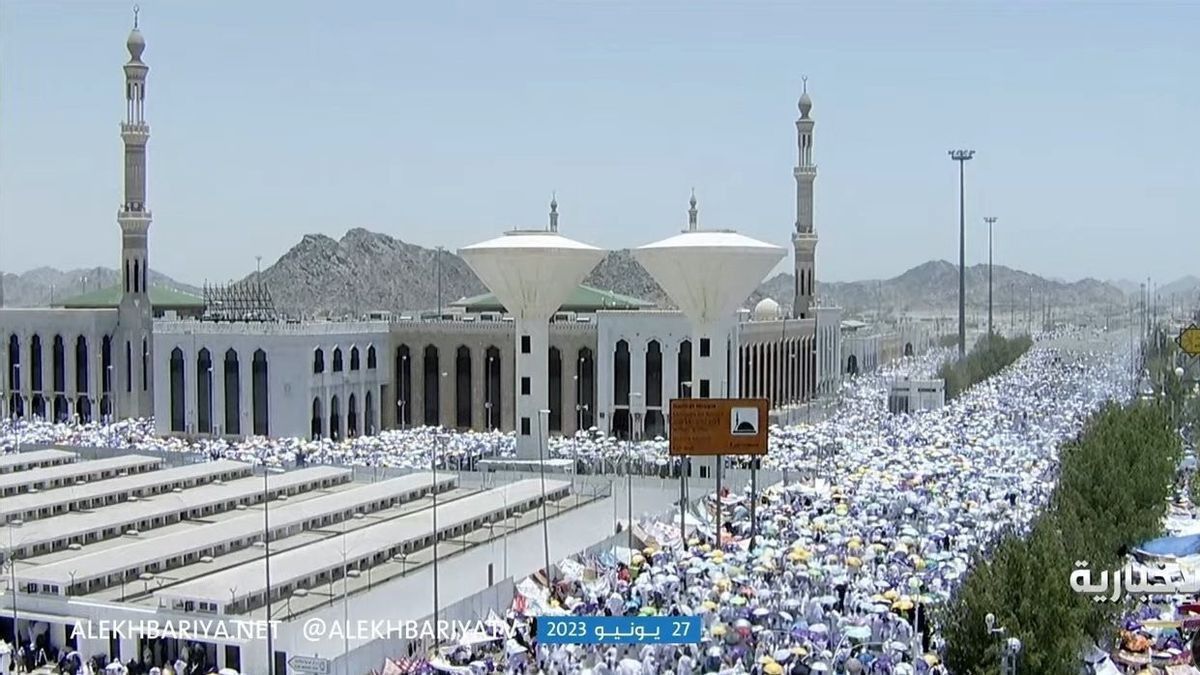JAKARTA - Commission VIII asked the Government to fix the management system for organizing the pilgrimage to make pilgrims more comfortable when carrying out worship. Moreover, following the many technical obstacles found in organizing this year's Hajj.
"There are quite important factors that we have not paid attention to so far, because the discussion is more focused on the hajj budget. One of the important factors is the management of the Hajj," said Deputy Chairman of Commission VIII DPR, Diah Pitaloka, Saturday, July 1.
Diah is one of the members of the DPR's Hajj Supervisory Team (Timwas) tasked with monitoring the implementation of the Hajj pilgrimage in Saudi Arabia. From the results of his supervision, he found that the management system for organizing Hajj and the needs of human resources (HR) officers were the most important issues that the Government had to fix.
As is known, the quota of Indonesian pilgrims for 2023 has increased to around 230 thousand people. There has been a more than 2 times increase compared to last year where the Government of Saudi Arabia only provided a quota of 100 thousand pilgrims for Indonesia.
Diah assessed that the crisis management in organizing the hajj this time was not optimal. Especially because many elderly pilgrims are prioritized to leave this year considering that due to the COVID-19 pandemic, there is an age limit for Hajj departures.
"Moreover, now taking a policy of 30 percent of the elderly, it means that there are 70 thousand elderly Indonesian pilgrims this time. This means that the technical workload for assistants will increase, but this is a test for the governance of our Hajj management," said Diah.
The elderly who perform the hajj have limitations in carrying out their worship. For this reason, said Diah, the role of the Hajj supervisor is crucial in the success of organizing the hajj by the Ministry of Religion (Kemenag).
"There are pilgrims who are actually in serious health and need to get help. Although of course people sometimes want to go for Hajj, the elderly really physically need personal assistants," he explained.
"Well, we haven't talked about the approach yet, so we have to be able to pay more attention to the quality of the service qualitatively," added Diah.
The Ministry of Religion is also expected to assign more Hajj officers, especially for elderly companions. With the increase in companions, Diah assessed that this could help elderly pilgrims who had difficulties when performing the pilgrimage.
"Today the role of Hajj assistants is very important. Currently, it cannot be personally an assistant because the capacity of the officer's quota cannot handle personnel to persons," he said.
"Indeed, there are elderly people who are handled by their peers but some who are not. Because it can't be accompanied continuously, people also have to worship. This is what we actually haven't got a technical picture of how the Ministry of Religion plans to deal with the elderly," added Diah.
According to him, there are various other problems besides the abandoned events of a number of pilgrims after performing the wukuf pilgrimage in Arafah. Diah gave an example of the problem of toilets which may be trivial in ordinary days, but when the implementation of the hajj becomes very significant, especially for the elderly.
The toilet queued for approximately an hour due to the extraordinary number of worshipers. "Well, in line with this one hour the elderly are sorry. We saw it sad. Yesterday there was also a leak yesterday. There were also the elderly who were in Mina going to Jamarat, even though they should be able to worship," he said.
Diah also asked the Government to properly evaluate the issue of maktab so that the incident of pilgrims sleeping outside the tent in Mina would no longer occur following excess capacity. Moreover, in this incident there were also elderly people.
"What is the format in the tent, who is on guard because you have to spend the night there. The hardest thing about the pilgrimage is in Arafah-Mina because there is no transportation," said Diah.
"So that person once threw a sum of 2-3 km, at least from our maktab tents. Now this is 3 times round and round, I can imagine that it is hot, then sleeping in the tent is outside, not to mention the limited toilets," he continued.
Diah stated that such conditions need effective and efficient management. One solution can be with a technical team that controls congregation activities while carrying out a series of Hajj services in Arafah, Muzdalifah, and Mina.
"This is to ensure quality control so that services for Hajj pilgrims are more optimal," explained Diah.
Through this technical team, the composition of the officers who handled the congregation while in Arafah, Muzdalifah, and Mina can also be clearer. Diah hopes that every existing obstacle can be quickly resolved if there are officers who are in charge.
"For example, one Hajj officer can handle how many pilgrims are there, so the composition of one officer holds how many pilgrims. Then what percentage of officers are effective, because these officers do not always accompany the congregation," he explained.
The quality control technical team can also play a role in anticipating the maktab for pilgrims who are instead used by pilgrims. Because not a few pilgrims were found who used the Hajj facilities so that the pilgrims were actually affected because the tent rations were taken.
"The issue of our tents being taken for pilgrimage, whose visas are tourist visas or visit visas. This must also be evaluated within the framework of management," said Diah.
Not only about tents, the legislator from the West Java III electoral district highlighted the quality of the overall education of the pilgrims. Diah asked Hajj organizers to continue to control the quality of service to the congregation, including in terms of accommodation or hotels where the congregation is staying while carrying out the pilgrimage.
"We also need officers to control. For example, there is a hotel where the service is replaced every day, some of the sheets are not replaced for a month, even though one room is 5-7 people," said Diah.
Regarding the quality of hotels, the leadership in the DPR in charge of religious affairs asked the Ministry of Religion to standardize. Diah said that the issue of this control system returned to the Hajj management system.
There needs to be someone who once or twice a week communicates with the hotel owner, submits a complaint, we ask to improve the service. So I think all the congregation's standrsr services must be the same," he said.
On the other hand, Diah encouraged the Ministry of Religion to evaluate the work system of Hajj officers. As the spearhead of Hajj services, the Ministry of Religion must be able to find the best possible format regarding the needs of human resources in charge of providing services to pilgrims.
Including working hours. Because the working hours are not flat, some may be small, some up to 16 hours a day. The workload increases, but the human resources are not prepared with the increased workload. This must be improved. We will evaluate it later," continued Diah.
"We also hope, for example, the officer's room, if possible, not one room, 5 people already don't have a washing machine. This is 2 months, you know. How do they help as personal assistants, if for themselves it's difficult," he added.
The implementation of the shift system or division of the officer's work schedule is also considered important. Moreover, the implementation of the pilgrimage is carried out at night so that the stamina of officers in providing services to the congregation can certainly run well.
"So the management of human resources and energy that we have never experienced so far. We simulate how it works. There must be a shift in the work system, the division of tasks because officers are also human, the body also needs rest," explained Diah.
One of the efforts that can be done, for example, is to increase empowerment of Indonesian citizens (WNI) who are in Saudi Arabia as an additional Hajj companion. Currently, the seasonal Hajj assistants are only around 200 people who are empowered as additional personnel in Hajj services by the Ministry of Religion.
"So far, we have been talking about food and hotel facilities, but I see it in the supervision of this Hajj, I try to see from another perspective. Management of services and human resources in the implementation of Hajj," said Diah.
Various difficulties faced by Indonesian pilgrims are said to be discussed by the DPR with the Ministry of Religion. Diah hopes that in the future the Government will have a solution to technical problems that occur in the field.
"This is homework, we see this in the framework of a work management and resource management including energy. This will be improved, we will re-evaluate the SOP, handle it, and others," he concluded.
The English, Chinese, Japanese, Arabic, and French versions are automatically generated by the AI. So there may still be inaccuracies in translating, please always see Indonesian as our main language. (system supported by DigitalSiber.id)













